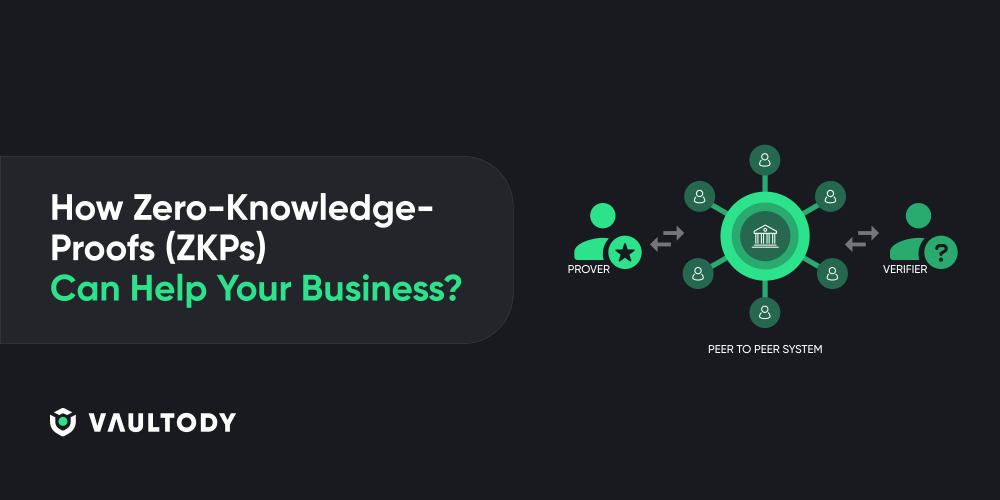By definition zero-knowledge proofs (ZKPs) represent a cryptographic method, allowing statement verification between two parties to be made, without revealing details about the statement details.
This may sound confusing, so in simple terms the party that verifies the statement (the verifier) must accept the statement made by the first party (the prover) without any additional information about the content of that statement being shared with the verifier.
As we outlined in a previous blog post, the main purpose of ZKPs is to protect privacy, which is why the content of the statement is allowed to be kept secret. A small reminder to justify the claimed high-privacy of this concept is the ability of ZKPs to preserve all confidential and sensitive data from being shared with the verifier.
ZKPs and Businesses
Zero knowledge proofs have a wide range of applications across industries and business sectors, so please bear in mind that this piece is focusing only on the ZKPs within the crypto and blockchain sector.
As with all other features that Vaultody MPC solutions provide to help create an unbeatable and difficult to match level of privacy and security, ZKPs find their use cases here as well.
From the perspective of our business clients, ZKPs can be very helpful when it comes to the following:
Privacy when making transactions
We already emphasized on the privacy element being a key advantage of ZKPs. The ZKPs are following the concept behind cryptocurrencies of ensuring the provision of private peer-to-peer transactions.
However, most of the crypto transactions in reality are not that private, since anyone can find and track them on public blockchains. Users' identities are often linked to real world identities (use of crypto domains, displaying wallet addresses on social media profiles and etc) or can be associated with real-world personas based on on-chain and off-chain analysis.
This is where the actual power of zero-knowledge proofs comes into play, as ZKPs can be applied on transactions and smart contracts that are visible on public blockchains. For instance, there are certain open-source decentralized coin mixers that utilize the ZKPs concept in order to allow users to make private transactions with a high degree of anonymity.
No risks of identity theft or fraud scheme
Being online requires proving your identity and rights to access platforms. This often requires providing personal information, such as names, dates of birthday, location, email addresses and others. On top of that, users are expected to come up with long and complex passwords that they need to memorize in order to gain access.
Zero-knowedge proofs are very popular in the context of decentralized identity (widely described as self-sovereign identity), allowing each individual/business to control access to personal identifiers. By not allowing/not sharing sensitive details, businesses can prevent their details being stolen, leaked or compromised. Through ZKPs getting access to platforms becomes easier, and with better privacy, eliminating the need to store huge personal information.
What is more, that ZKPs are helping keep on-chain voting as authentic as possible. Even in on-chain voting there is an issue called collusion, which is associated with bribery and decievement of others. For example, company or user named “X” can bribe another user or company, called “Y” to vote for option 2, despite the “Y” desire to vote for option 1 in a possible onchain voting scenario.
There are solutions which incorporate the ZKPs concept and allow gathering votes, such as the Minimum-Anti Collusion Infrastructure (MACI) which is a set of smart contracts and scripts, allowing a coordinator to aggregate votes and confirm results without revealing details about who exactly and how each participant voted.
Cross-organizational collaboration
In business settings, organizations often face the need to partner with another organization to attain their business objectives. In many of the cases, corporations are concerned that they may provide sensitive information or data that may become a “weapon” in the hands of their competitors.
ZKPs are preventing sharing all details which company “A” do not wish to share with company “B”, but at the same time both organizations can perform computations on their combined data, whilst keeping intact individual data sets.
Regulatory compliance
The scope in terms of regulations and compliances can be very broad, but it is worth mentioning some of the most popular use cases of ZKPs in terms of regulatory compliances. The ZKPs can be employed in Know-Your-Customer (KYC), Know-Your-Business (KYB; available in Vaultody), Anti-Money Laundering (AML), accounting and auditability and others.
For instance, to meet AML requirements, customers must prove that they meet a specific set of criteria without the need to provide personal data. This allows banks to maintain compliance without extracting information about the customer - whether an individual or a business.
In terms of KYB, everything that we mentioned about AML is valid here too. Once you become a Vaultody`s client and you get to the point where our KYB form must be completed, you will only have to match the KYB requirements without providing information beyond the necessary.
In addition, there is another element that highlights ZKPs advantages when used in regulation compliances - collected data is minimal as only vital information is gathered, reducing risks of data breaches. This also contributes to boosting the overall efficiency and security.
To conclude, we acknowledge the presence of other use cases of ZKPs for businesses in addition to the main use cases and advantages that we listed above. If you are unsure how ZKPs can help with your business, and especially the ZKPs utilization through our comprehensive solutions, you can always receive information and guidance from our dedicated team to help you with onboarding.









 Copy link
Copy link